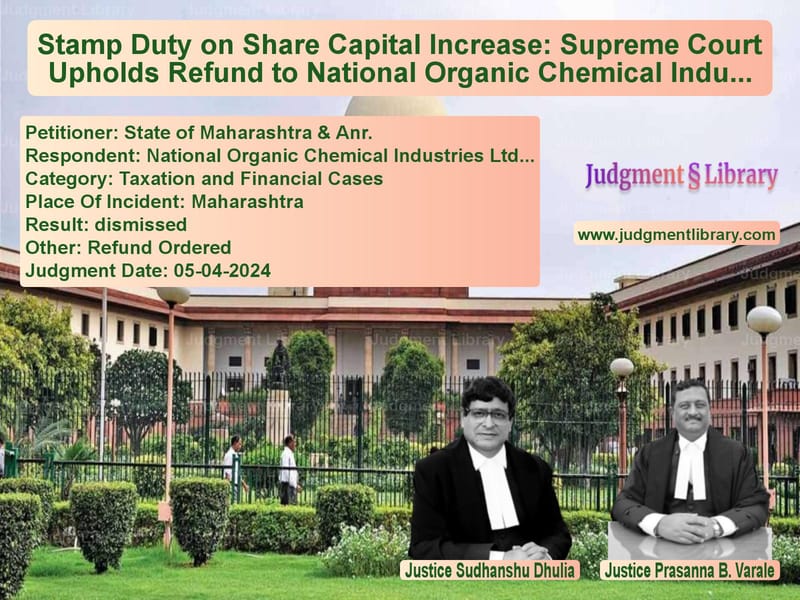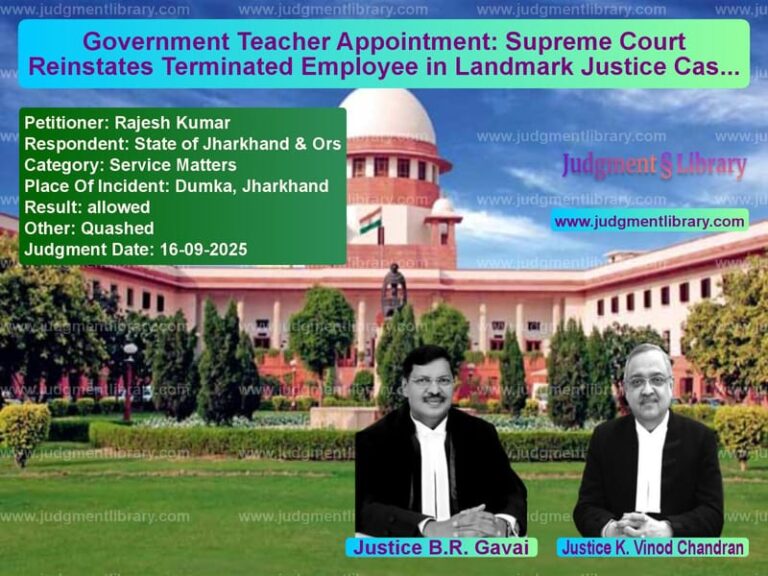Stamp Duty on Share Capital Increase: Supreme Court Upholds Refund to National Organic Chemical Industries
The Supreme Court of India recently delivered a crucial judgment in State of Maharashtra & Anr. v. National Organic Chemical Industries Ltd., clarifying the applicability of stamp duty on increases in share capital. The case involved a dispute over whether an increase in share capital required fresh stamp duty when the maximum prescribed duty had already been paid earlier. The Court upheld the Bombay High Court’s ruling, directing the State of Maharashtra to refund Rs. 25 lakhs paid by the respondent company along with interest.
Background of the Case
National Organic Chemical Industries Ltd. (NOCIL), the respondent, was incorporated with an initial share capital of Rs.36 crores. In 1992, it increased its share capital to Rs. 600 crores and paid Rs. 1,12,80,000 in stamp duty under Article 10 of Schedule-I of the Bombay Stamp Act, 1958. However, in 1994, the State of Maharashtra amended the provision, capping the maximum stamp duty payable on Articles of Association at Rs. 25 lakhs.
Later, NOCIL further increased its share capital to Rs. 1,200 crores and paid another Rs. 25 lakhs as stamp duty. Realizing that it had already paid the maximum duty earlier, NOCIL requested a refund. The Deputy Superintendent of Stamps rejected the request, stating that fresh stamp duty was applicable on each increase in share capital. NOCIL challenged this decision in the Bombay High Court, which ruled in its favor and ordered a refund.
Arguments by the Appellants (State of Maharashtra)
- The State contended that every time a company increases its share capital, it constitutes a fresh taxable event, requiring payment of stamp duty.
- They relied on Section 14A of the Bombay Stamp Act, arguing that any material alteration to an instrument, such as an increase in share capital, necessitates fresh stamping.
- They also argued that since the 1994 amendment capping stamp duty at Rs. 25 lakhs was introduced after NOCIL had already paid Rs.1,12,80,000, the earlier payment should not be considered while determining future stamp duty liabilities.
Arguments by the Respondents (NOCIL)
- NOCIL argued that only the Articles of Association were chargeable to stamp duty, not Form No. 5, which merely notified the Registrar about an increase in share capital.
- They contended that once the maximum cap of Rs. 25 lakhs had been paid under the amended provision, no further stamp duty should be required.
- They relied on various judgments, emphasizing that fiscal statutes must be interpreted strictly, and any ambiguity must be resolved in favor of the taxpayer.
Key Observations of the Supreme Court
- The Court held that Form No. 5, used to notify the Registrar of an increase in share capital, is not an “instrument” under Section 2(l) of the Bombay Stamp Act and therefore cannot attract stamp duty.
- It observed that the Articles of Association are the only instrument chargeable to stamp duty, and once the maximum cap of Rs. 25 lakhs has been paid, no further duty is required for subsequent increases in share capital.
- The Court rejected the State’s reliance on Section 14A, stating that an increase in share capital does not materially alter the Articles of Association in a way that necessitates fresh stamping.
- It ruled that the legislative intent behind the amendment was to impose a one-time cap on stamp duty, not to charge companies repeatedly for every increase in share capital.
Final Judgment
The Supreme Court dismissed the appeal and upheld the Bombay High Court’s decision. It directed the State of Maharashtra to refund Rs. 25 lakhs to NOCIL along with interest at 6% per annum. The Court held:
“The effect of the 1994 amendment was to introduce a maximum cap on stamp duty for Articles of Association. Once this cap has been reached, no further duty is payable on subsequent increases in share capital.”
Implications of the Judgment
- The ruling establishes that companies that have already paid the maximum stamp duty on their Articles of Association cannot be charged again for future increases in share capital.
- It clarifies that Form No. 5, being a mere notification document, does not attract stamp duty.
- The decision reinforces the principle that tax laws must be strictly interpreted, and ambiguities must be resolved in favor of taxpayers.
Conclusion
The Supreme Court’s ruling in this case is a landmark decision for corporate entities dealing with stamp duty on share capital increases. It ensures that businesses are not unfairly burdened with repeated taxation and reaffirms the importance of strict interpretation of fiscal statutes. By upholding the refund to NOCIL, the Court has provided much-needed clarity on the applicability of stamp duty under the Bombay Stamp Act.
Read also: https://judgmentlibrary.com/sc-upholds-customs-duty-valuation-dismisses-appeal-against-cestat-order/
Petitioner Name: State of Maharashtra & Anr..Respondent Name: National Organic Chemical Industries Ltd..Judgment By: Justice Sudhanshu Dhulia, Justice Prasanna B. Varale.Place Of Incident: Maharashtra.Judgment Date: 05-04-2024.
Don’t miss out on the full details! Download the complete judgment in PDF format below and gain valuable insights instantly!
Download Judgment: state-of-maharashtra-vs-national-organic-che-supreme-court-of-india-judgment-dated-05-04-2024.pdf
Directly Download Judgment: Directly download this Judgment
See all petitions in Banking Regulations
See all petitions in Tax Refund Disputes
See all petitions in Corporate Compliance
See all petitions in Judgment by Sudhanshu Dhulia
See all petitions in Judgment by Prasanna Bhalachandra Varale
See all petitions in dismissed
See all petitions in Refund Ordered
See all petitions in supreme court of India judgments April 2024
See all petitions in 2024 judgments
See all posts in Taxation and Financial Cases Category
See all allowed petitions in Taxation and Financial Cases Category
See all Dismissed petitions in Taxation and Financial Cases Category
See all partially allowed petitions in Taxation and Financial Cases Category







